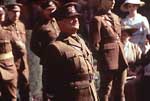
To clarify before opinionizing: All the King’s Men (Sunday, February 20; 9 to 11 p.m.; Channel 13) has nothing whatever to do with the Robert Penn Warren novel. Or the Broderick Crawford movie. Or even Humpty Dumpty’s poem, although there is plenty of grander poetry, from Homer on the death of heroes to Rupert Brooke, that potted aspidistra, on “some corner of a foreign field that is forever England.” But the men we meet in this “Masterpiece Theatre” production belong quite literally to King George V. They are the servants, gardeners, and grooms on his Sandringham country estate, looked after with a kindly eye by his mother, Queen Alexandra, to whom they are touchingly devoted (as we are, too, since she’s played by Maggie Smith). They have put on uniforms and been drilled into rude shape to fight the Hun in World War I. They are shipped off, an entire company of upset stomachs, to the Turkish coast in the Dardanelles. And at Gallipoli, on August 12, 1915, every single one of them will vanish into a sudden and pervasive mist, a “golden cloud,” never to be seen again.
Well, the whole Dardanelles campaign, as we already know from Peter Weir’s Australian perspective in Gallipoli (1981) was a bad idea, costing Britain and its Commonwealth 213,980 casualties and Winston Churchill his job as Lord Admiral. Nor had the Sandringham volunteers any way of knowing that they confronted Mustafa Kemal, the future Atatürk, in the bloody playpen of the Byzantines and Ottomans. They might as well have been swallowed up by the local mound-tombs of the ancient kings of Thrace.
Adapted by Alma Cullen from a novel by co-producer Nigel McCrery, All the King’s Men is an elegy as much as it is a film. It mourns a paradise lost that’s pastoral, a Crown benignly patriarchal, a yeomanry gung-ho loyal, a class system basically feudal, and an innocence impossibly rustic. On the other hand, this lamentation will be looked at with a postcolonial squint. The British had no more business in Turkey than Mel Gibson.
Frank Beck (David Jason), the middle-aged estate manager who trains these boys to be men and then, abetted by the Queen Mother, leads them into disappearance, embodies the stouthearted values of the old order. Claude Howlett (Patrick Malahide), the battalion doctor who has actually experienced combat as well as concentration camps during the Boer War, is a self-hating cynic bereft of illusions. This is shrewd casting. Both are familiar to those of us who watch too many British mystery movies on public television – Jason as Inspector Jack Frost, the sad sack whose domestic life is such a shambles; Malahide as Inspector Alleyn, the melancholy aristocrat with a traumatizing (First World War) wound. When at Gallipoli Howlett says to Beck, “You’ve always trusted the judgment of your betters,” he is speaking as a “better” already aware that they don’t know anything. Of course their maps are useless. It is the old order that vanishes into the mist.
None of this would work as beautifully as it does if we didn’t believe in Maggie Smith as a Queen Mother worth cherishing; if Sandringham (playing itself here) weren’t such a sunlit dream of first love, tall oaks, deep pools, and hungry swans; if Beck weren’t as decent as he was bewildered; if the music hadn’t verged so often on a dirge; if in some corner of our own hearts we didn’t wish that Rupert Brooke had been right and Homer wrong. What really happened to the men of Sandringham the British government never said, preferring miracle mists. All the King’s Men tells all, a routine atrocity. But besides waste, there is honor in these two hours. And although the fashion nowadays is to beat up on the whole idea of utopia, they also remind us that we dream our perfect republics in both directions, left and right, in the always radiant future or the impossibly nostalgic past.